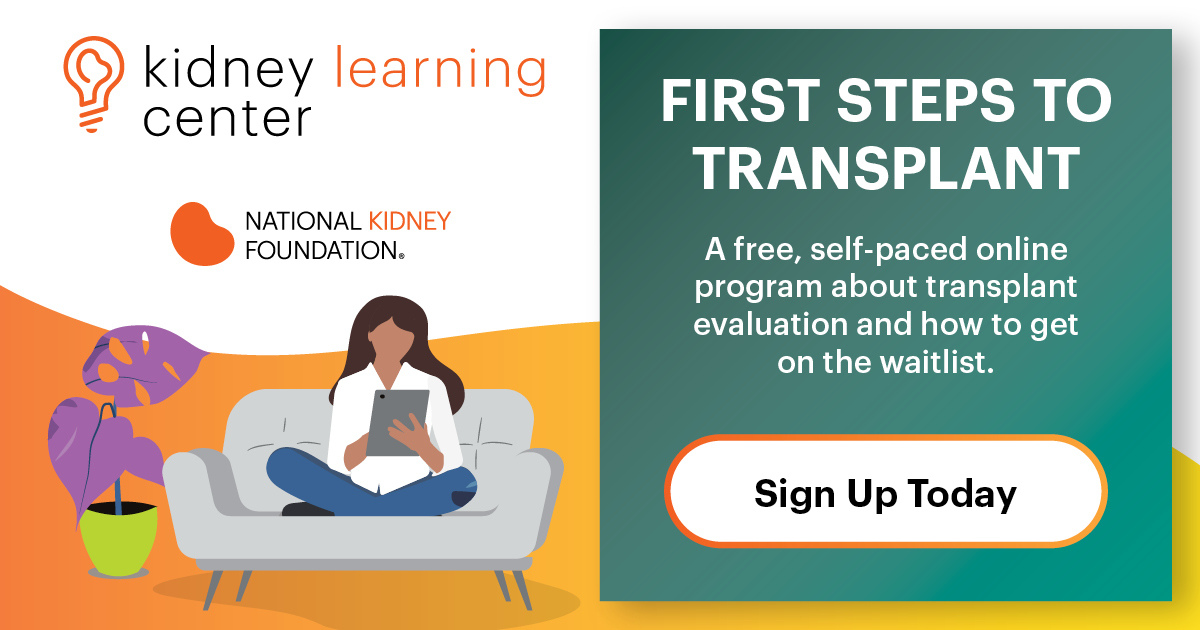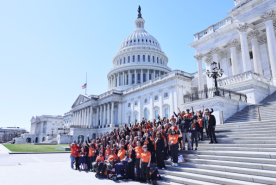June 20, 2023
Recent studies have found that over 50% of LGBTQ+ people experience some form of healthcare discrimination1 and over 25% of transgender people reported being denied care due to their transgender status.2 Not having proper health care or avoiding health care due to discrimination, can result in dire consequences, including an increased risk of health problems.
What is this discrimination, and how can you advocate for yourself and LGBTQIA+ rights? Dr. Joshua Wilder, a podiatrist, and Representative Jeff Currey, two kidney transplant recipients and members of the LGBTQIA+ community, discuss this and more.
What discrimination does the LGBTQIA+ community face?
The American Civil Liberties Union (ACLU) tracked over 490 anti-LGBTQ bills introduced or passed during the 2023 legislative session.3
Of these, over 125 targets medically-necessary healthcare, including:
- Blocking Medicaid for transgender people
- Banning affirming care for trans youth
- Barring funding to centers that offer gender-affirming care
- Stopping insurance coverage for trans people
- Allowing hospitals to deny or provide unequal care to LGBTQIA+ people
As bills targeting LGBTQIA+ people continue to get introduced and passed, it is likely that more people in the LGBTQIA+ community, especially LGBTQIA+ people of color who face additional social determinants of health, will experience higher rates of discrimination that could result in health issues.
For Dr. Joshua Wilder, his first experience with medical discrimination occurred when he was only twelve. Read Dr. Wilder’s full story.
"I was born with a rare condition called Prune Belly syndrome where my urinary tract system wasn't fully developed. Doctors didn't think I'd survive past five, but I got a kidney transplant when I was nine. When I was twelve, I went to my first appointment without my parents to talk with the physician. I told him I was questioning my sexuality and his entire attitude changed from friendly to cold and distant," said Dr. Joshua Wilder. "When I left that doctor's appointment, I remember the nurses just kind of looking at me and whispering. This discrimination was passive, but I still felt it."
Sadly, these negative experiences can follow the LGBTQIA+ community, even in an LGBTQIA+-friendly state.
"I live in and represent the state of Connecticut. We are a very safe, progressive space but still have pockets of colleagues who would like to go in the same direction as other anti-trans and anti-LGBTQ states. We've had proposals from various legislators on anti-trans pieces, like high school sports. That lawsuit banning trans kids from sports originated here but we prevailed against it," said Representative Jeff Currey. "If we pass anti-LGBTQIA+ laws, we are making statistics surrounding suicide and suicide ideation worse."
The Trevor Project confirms Representative Currey's fears of rising rates of suicide and suicide ideation–in their 2022 survey, 73% of LGBTQ youth reported symptoms of anxiety, 45% considered suicide, and 14% attempted it.4
Are you a member of the LGBTQIA+ community looking for kidney disease support? We can help. Connect with a peer mentor who understands your situation or contact NKF Cares for answers and resources.
Connecting LGBTQIA+ discrimination to kidney disease
With 1 in 3 adults in the United States at risk for kidney disease, early diagnosis, and preventative care are crucial in preventing the progression of kidney disease to kidney failure. If people avoid healthcare due to discrimination, they aren't getting tested for kidney disease or its risk factors like high blood pressure and diabetes.
Take this one-minute quiz to determine if you are at risk.
"25% of my patients are in the queer community and one of their biggest issues is discrimination in healthcare. They already get that type of treatment on the street, at their place of worship, or in their own home," Dr. Joshua Wilder said. "When you get that from your healthcare network, especially if you are young, it can increase the risk of mental disorders, suicide ideation, and substance abuse."
Substance abuse is often used as a numbing activity to dull the pain of discrimination. Unfortunately these numbing activities, like smoking or drinking, also increase the risk of health problems including kidney disease.
"Queer patients have told me that doctors don't listen to them or give them the treatment they need. Many patients then turn around and smoke cigarettes or drink because they internalize that negative situation. They just want to get rid of the feeling that they're not a part of anything," Dr. Joshua Wilder. "The queer community is looked at as pariahs or different. Living in a heteronormative world and being turned away from the health care community makes them feel like they are nothing."
As a result of discrimination in healthcare, housing, and employment, along with participation in numbing activities, older LGBTQIA+ adults have higher instances of kidney disease when compared to their heterosexual peers.5
While finding equitable care may be more challenging, it isn't impossible. Finding a reliable healthcare provider and getting regular check-ups is one of the best things you can do for your kidneys and overall health.
"Everyone deserves the right care. To get it, look online or call your insurance company. Explain that you are a queer individual, lesbian, bisexual, transgender, etc, and see if there is anyone in your network who is LGBTQ-friendly," Dr. Wilder said. "Talk to your friends to see if they’ve gone to health care providers open to treating those who are in the queer community."
"We welcome all queer people into the state of Connecticut to see health care providers. We want to ensure that that your voice is being heard, you're being listened to, and that we are providing life-saving health care, like gender-affirming care," said Representative Currey.
Here's how nephrologists can provide LGBTQ+ patients with affirming care.
Advocating for yourself and others
Despite these alarming statistics, there is hope! More people and organizations are stepping up daily to fight for LGBTQIA+ equity, and you can too!
"Everyone deserves equitable access to the healthcare they need to become who they’ve always known they are. So, speak up. Don't wait for permission. Use your voice. Use it loudly," said Representative Currey. "Go to your local elected leader and use them as a conduit for change and speak with your respective legislators about increasing educational requirements for medical professionals. Find local organizations attached to these issues to help tailor your messaging and get you through doors where you may not be able to get into alone."
No matter what, never give up on yourself.
"Try to be yourself and take it one step at a time. Control what you can control. Be who you are–your authentic self," said Representative Currey. "If people don't appreciate or want to affirm you, that isn't on you. Don't let it weigh you down."
"I've been living with adversity since the day I was born. I wasn't supposed to be here, so I always tell people to take it one day at a time and never change who you are to fit into someone else's box," Dr. Wilder said. "The moment I stopped trying to be someone else, my true friends showed up, uplifted me, and helped me through adversity."
Resources for LGBTQIA+ people can save lives!
Here are some you should know:
- Human Rights Campaign
- The Trevor Project
- The Business of Belonging
- Transgender Law Center
Learn more about the advocacy NKF is doing or get involved.
Sources
1“Discrimination Contributes to Poorer Heart Health for LGBTQ Adults.” American Heart Association, 8 Oct. 2020, newsroom.heart.org/news/discrimination-contributes-to-poorer-heart-health-for-lgbtq-adults.
2Silver JK, Bean AC, Slocum C, Poorman JA, Tenforde A, Blauwet CA, Kirch RA, Parekh R, Amonoo HL, Zafonte R, Osterbur D. Physician Workforce Disparities and Patient Care: A Narrative Review. Health Equity. 2019 Jul 1;3(1):360-377. doi: 10.1089/heq.2019.0040. PMID: 31312783; PMCID: PMC6626972
3“Mapping Attacks on LGBTQ Rights in U.S. State Legislatures.” American Civil Liberties Union, 12 May 2023, www.aclu.org/legislative-attacks-on-lgbtq-rights#categories.
4“2022 National Survey on LGBTQ Youth Mental Health.” The Trevor Project, www.thetrevorproject.org/survey-2022/. Accessed 22 May 2023.
5Chandra, Meghana1; Hertel, Mollie1; Cahill, Sean2; Sakaguchi, Kevin2; Khanna, Saumya1; Mitra, Shimontini2; Luke, Jordi3; Khau, Meagan3; Mirabella, Jack3; Cropper, Avareena3. Prevalence of Self-Reported Kidney Disease in Older Adults by Sexual Orientation: Behavioral Risk Factor Surveillance System Analysis (2014–2019). Journal of the American Society of Nephrology 34(4):p 682-693, April 2023. | DOI: 10.1681/ASN.0000000000000065











